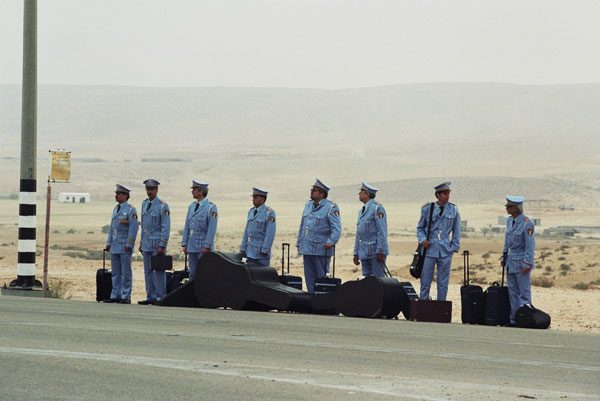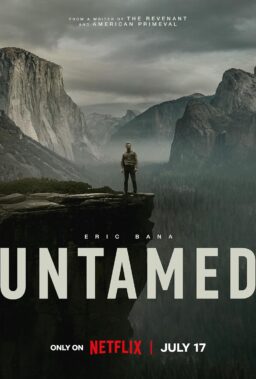All of the movies in this series take stances, but those standing on either side of a disputed wall are not the only participants in a clash. So too are the witnesses. We will see in later entries that some are pro-Israeli while others are pro-Palestinian. In the list below, however, some of the films about Palestine/Israel do not side with either population as much as they side with a hope. Some hope for reconciliation and peace. Others, however, hope for annihilation and dominance. Last, we will look at two special cases.
First, the hopeful films. The common element in both of these films is that first, they are fish-out-of-water tales, involving accidental relationships. Second, they call on the opposing forces to see each other’s humanity, including the hope and heartbreak the come with the human experience. Third, much discovery happens beyond the native languages Arabic and Hebrew, through alternate languages (French and English), and through music. Thus, fourth, the films’ optimisms rely on fate rather than free will. In other words, only God can fix this problem.
“The Other Son” (2012, Lorraine Lévy)
What happens when you find out that your identity is not only taken from you, but is exchanged with the enemy? As an 18-year-old Israeli man enlists in the military, his parents discover that he does not share their blood type. Meaning, he is not their son. He is not even Israeli or Jewish. Meanwhile, the child he was accidentally switched with returns home to his (perceived) Palestinian family.
Each family discovers that their son belongs to the other side. They cannot abandon the young men they raised, so they have to embrace their “new” sons, which means that they have to carefully embrace their new extended families. I’ve conducted a number of interfaith and intercultural marriages and those participants go through many of the same processes we find in this film: lowering guards, reducing resistance, double-checking hate.
What happens when your identity is switched? You are forced to see yourself and your enemy first as humans. If you are not used to seeing humanity, then you will find yourself—as do the characters in this film—stunned, shaken, and confused.

“The Band’s Visit” (2007, Eran Kolirin)
A very quiet movie about very quiet people in a very quiet district. An Egyptian orchestra accidentally lands in the wrong town in Israel. They are stranded until the next bus would arrive, the next day, waiting in a diner for something to transpire. The locals take them in, hesitatingly starting conversation. As they open up for each other, they discover they do not share dreams as much as they share the ability to dream, and to hurt. And to mock. And to desire. And to stumble.
This film rightly received accolades, both as a film and as a bridge-builder. It features some profound performances, with actors engaging in conflicts of ethnicity, gender, age, power, but mostly hopefulness and hopelessness. I have to point out, however, that there are no Palestinians in this film. There is no Palestine in this film. While some present the conflict as Israeli vs. Palestinian, others move wider, framing it as Israeli vs. Arab, even though Israel has alliances with Egypt and Jordan. On that note, there is also no religion in this film; no Jewish, no Muslim. Just people full of stories and feelings.
There are other well-intentioned films worth considering, like “The Visitor” (2007, McCarthy) placing focus on an American Professor and a Palestinian immigrant woman, and “Arranged” (2007, Crespo and Schaefer) about an Arab Muslim and an Orthodox Jewish woman teaching together at a New York public school. They take place here in the United States; my focus is on films that speak directly of Jerusalem, Palestine, and/or Israel.
On the other hand, there are a few series of films that are purely venomous. They are not, technically, major films, but they are part of major ideological movements, whose triumphalist goals trump any concern for humanity. The common thread in these films is simple: war. They want blood.
The Clarion Fund “Documentaries”
In the 1980s, the leading production company producing Anti-Arab hate was the Cannon Group with its B-movies, including “Delta Force.” Now, the Clarion Fund not only produces documentaries portraying Muslims as marching in a relentless scheme against the West, but has distributed copies of their films across American libraries, houses of worship, and Fox News. Every leader of a church, synagogue, or library that has held screenings of these movies should be ashamed.
Their titles include “Obsession: Radical Islam’s War Against the West,” “The Third Jihad: Radical Islam’s Vision for America,” and “Iranium.” The first argues that Muslims have no other purpose in life, but to seek the destruction of America and Israel. The second—making an allusion to Hitler’s Third Reich—asserts that Muslims are already in advanced stages of a planned global dominance, achieved by bloodshed. The third argues that Iran is the central threat, producing nuclear weapons, not for energy but for global dominance and destruction. The Clarion Fund has branched out into female genital mutilation, through “Honor Diaries” again placing most of its focus on Muslims, but that film is peripheral to our immediate discussion.
The current Israeli Prime Minister has been preaching for more than 20 years that Iran is a nuclear threat, seeking to destroy Israel, and he will surely continue to do so for the next 20. That is not to say that the Iranian regime is an innocuous presence in the Middle East, especially with the bloodshed in Syria, or the previous president’s politically calculated but loose comments about the Holocaust and Israel. Nuclear nations (America and Israel) speaking of nuclear threats is nothing but an exercise of power, promoting the war machine. Similarly, every few years, India and Pakistan start firing accusations against each other about their nuclear capabilities and ambitions. The posturing is inconsistent and reckless.

“Left Behind: The Movie” (2000, Sarin) and its sequels:
The Rapture has begun and the Anti-Christ has appeared. Destruction and chaos consume the world. A rabbi wants to announce that Jesus is the Son of God. An African-American POTUS converts to Christianity.
The Christian Apocalypse genre is a multi-billion dollar industry of films, television shows, books, games and propaganda. We would suspect that it relates to the Book of Revelation, but it has little resemblance to the sacred text, except through very selective metaphor. But, the goal is the return of Jesus to establish peace, starting with the Holy Land. Considering the way Jews and Muslims are largely disregarded in these stories, it is fair to say that the goal of Christian triumph and domination is as important to many of the producers and viewers as the appearance of the Messiah. In any case, among the various Zionist movements, including those which seek a safe haven for the Jews, those which seek a Jewish State, and others, the largest, most aggressive movement is the Christian Zionist movement, that is a major force in the Republican and Tea Parties.
The series did not continue beyond a few films. Instead, it will return. This film’s remake is set for release in October 2014, with a star studded cast, including Chad Michael Murray, Nicky Whelan, Jordin Sparks and…Nicolas Cage?
We must give special attention to two films.
“World War Z” (2013, Forster)
Max Brooks’ book is notoriously anti-Palestinian, unfortunately. The film, not so much because Palestinians barely have a presence in the film. We, however, should note this film for two reasons. First, just as “The Visitor” is one of the rare cases of a major American film featuring a major, sympathetic Palestinian character, this film has the rare example of a sympathetic Israeli character, helping Brad Pitt save the world.
But, this film makes no attempts at building bridges. Rather, the opposite is true. There is an absurd moment in Jerusalem, surrounded by walls that are keeping out the rabid zombies. Israel here is essentially Jerusalem, and is one of the few places on earth safe from the creatures. That is, until peaceniks start singing. That energizes the zombies, who scale the walls and quickly wipe out the Holy Land and everyone in it. Meaning, the peacemakers ruined everything.

“Munich” (2005, Spielberg)
Palestinians have kidnapped and killed the Israeli athletes at the Munich Olympics in 1972. Now, the Israeli authorities have to figure out how to hunt down the killers and those who sent them. The first problem is that the world—Europe—is still hostile to Jews so that relationships of convenience have to get established. A bigger problem is that Israel faces ethical dilemmas here, requiring the killing of suspects to protect the citizens. But, as the film unfolds, the biggest problem is that Israel itself has entered a cycle of vengeance. For every killing of a Palestinian suspect, Israel gets hit back with a bombing. And the cycle of destruction keeps getting worse.
Spielberg’s film is complex and complicated. Politics aside, it might be his most intense, powerful, dramatic film. There is not much to praise about his depiction of the Palestinians: almost all are gun-toting villains hell-bent on keeping their land. Except for the central few characters, who are very vivid, most of the Israelis are types without dimension. But, the film represents a very provocative open, internal conversation about the global safety of Jews and the problems of Israel’s methods. He is trying to catalyze the discussion.
Of all the films on this list, this film is the most controversial, but it is also the most mature. For starters, a common Palestinian complaint is that Israel can apparently receive criticism in every country of the world, especially Israel itself, but not in America. In this movie, Hollywood’s most successful director presents us with a film that clearly expresses a love for Israel, for the Jewish people, but it raises uncomfortable questions about how things are playing out. One of the central characters is a toymaker assigned to make bombs to kill the suspects and killers; he vocally complains that what they are doing is not Jewish. I suspect that character was Spielberg presenting himself.
Next time: Pro-Israeli films.
Read the other three parts of Muzaffer’s series here, here, and here.












